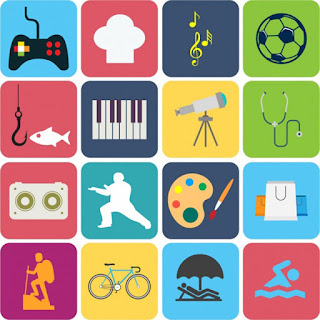German - Deutsch
Joe: Du hast ja viele Tennisschläger hier, Anke!
Anke: Oh ja! Tennis ist mein Lieblingssport! Magst du Tennis?
Joe: Tennis? Nein, ich mag Tennis nicht …
Anke: Oh, wirklich?! Aber Tennis ist doch toll! Ich spiele jede Woche mit Freunden Tennis.
Joe: Hmm, jede Woche. Also ist Tennis dein Hobby …
Anke: Ja, genau. Hast du ein Hobby?
Joe: Ja, ich habe viele Hobbys. Meine Hobbys sind Lesen, Schwimmen und Fahrradfahren. Und ich mag Musik.
Anke: Du hast aber viele Hobbys. Und du machst viel Sport!
Joe: Ja. In meiner Familie mögen wir alle Sport. Meine Brüder spielen Basketball und natürlich Eishockey. Und meine Schwester und meine Eltern tanzen.
Anke: Wow. Ihr mögt Sport wirklich sehr!
Joe: Ja. Und ich reise auch gern.
Anke: Oh, ich auch!
Joe: Du kannst mich ja mal in Washington besuchen!
Anke: Ja gerne!
Joe: Ich werde nächste Woche nach München fahren und dann fahre ich vielleicht noch nach Zürich.
Anke: Oh toll, ich mag München! Und Zürich ist auch eine schöne Stadt! Du musst mir eine Postkarte schreiben!
Joe: Ja, werde ich!
English - Englisch
Joe: You have a lot of tennis racquets here, Anke!
Anke: Oh yes! Tennis is my favorite sport! Do you like tennis?
Joe: Tennis? No, I don't like tennis...
Anke: Oh, really?! But tennis is so great! I play tennis every week with friends.
Joe: Hmm, every week. So tennis is your hobby...
Anke: Yes, exactly. Do you have a hobby?
Joe: Yes, I have many hobbies. My hobbies are reading, swimming and bicycle-riding. And I like music.
Anke: You have a lot of hobbies. And you do a lot of sports!
Joe: Yes. In my family, we all like sports. My brothers play basketball and ice-hockey of course. And my sister and my parents dance.
Anke: Wow.You really like sports!
Joe: Yes. And I also like to travel. [travel gladly]
Anke: Oh, I do, too!
Joe: You can visit me in Washington some time!
Anke: Yes, gladly!
Joe: I am going to go to Munich next week and then I am maybe going to go on to Zurich.
Anke: Oh great, I like Munich! And Zurich is also a nice city! You have to write me a postcard!
Joe: Yes, I will!
Vocabulary Phrase Usage
1. Tennisschläger consists of "Tennis" and "Schläger". The -er ending in "Schläger" is for a person who does something, and the base word is "schlagen" (to beat). So "Schläger" means "beater" or also "club", the thing that you use for beating. "Tennisschläger" = "tennis club" 2. Fahrradfahren is a noun created on the basis of "Fahrrad" (bike) and "fahren" (to drive, go). You could also say "Ich fahre gern Fahrrad" - never mind that Germans "drive a bike". 3. "ja" in the phrase "Du kannst mich ja mal in Washington besuchen" is simply an affirmation, like saying "you know you can".
Grammar Points
The focus of this lesson is the irregular German verb "mögen" (to like)
Ihr mögt Sport wirklich sehr!
"Your really like sports a lot!"
„mögen“ (to like) is another irregular German verb. In this lesson’s dialog you have encountered several forms of it, such as „du magst“ and „wir mögen“. „mögen“ is like the modal verbs „können“ or
„müssen“, which you've seen before, in that it has one stem for the singular forms and one stem for plural. „mögen“ uses the stem „mag-“ for all singular forms: ich mag, du magst, er mag (NOT „er magt“, note there's no -t!). For plural it reverts back to „mögen“ as a stem: wir mögen, ihr mögt, sie mögen.
This is an extremely useful verb when talking about what you like and dislike, so learn it well!
Cultural Insight
German hobbies In their free time, Germans watch a lot of TV – 3 hours a day on average. This is still lower than the American average of roughly 4 hours a day, but steadily rising. The single most popular hobby apart from watching TV or surfing the internet is probably soccer. The majority of Germans are or have been in a soccer club at some point in their life. The entire scene of hobby clubs is more developed than in America because schools don’t typically offer many clubs of their own – so youths and adults alike join public clubs instead. Every city has a large range of sports clubs, from ball games to martial arts and dancing. There are also gaming clubs; particularly popular are Skat and Doppelkopf (German card games), chess and German board games. Then, there are clubs dedicated to keep alive some part of culture, such as the shooting clubs, Karneval clubs, dialect clubs and foreign folklore clubs. Finally, there are breeding clubs (rabbits, pigeons…), collector clubs and much more.


DANKE
ReplyDelete